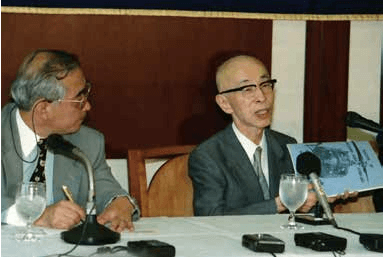Issue:
The controversial professor

Professor Saburo Ienaga, controversial historian and educator, speaking at the Club on Sept. 2, 1997, following a partial court victory in his ongoing fight against what he called censorship by the Japanese government in their screening of his high school textbook. Giving him full attention is former 1987-88 FCCJ president Naoaki Usui (McGraw-Hill).
Born in Nagoya in 1913, Saburo Ienaga graduated from the University of Tokyo in 1937. In 1949, he became a professor at the Tokyo University of Education a venerable institution founded by the government in 1872 that became the University of Tsukuba in 1973 where he later became a professor emeritus. From 1977 until 1984, he taught at Chuo University. He authored some 50 books, including several in English, and in 1984, was awarded the Japan Academy Prize.
Ienaga’s long struggle against government textbook screening dated from the early 1960s, following alterations and deletions required by Japan’s Ministry of Education in revised editions of his 1947 high school textbook. According to the ministry, the revisions were required because of factual errors and matters of opinion. It took until 1997 until Japan’s Supreme Court found in a ruling that the government’s removal of his description of biological experiments on people in China by the Japanese Imperial Army’s Unit 731 during WWII was illegal.
It was only a partial victory: the Supreme Court also rejected his claims of illegal removal of four other descriptions of wartime atrocities. Despite it only being partially successful, however, Ienaga’s fight against what he called censorship of textbooks by the ministry’s screening process continued even after his retirement. It apparently had a beneficial side effect in that it encouraged other authors of Japanese school textbooks to include descriptions of Japanese wartime atrocities.
Ienaga was nominated by Noam Chomsky and other scholars for the Nobel Peace Prize in 1999 and again in 2001. In his later years, he suffered from Parkinson’s disease, which may have affected his battle with the government.
He died on Nov. 29, 2002, at the age of 89.
– Charles Pomeroy
editor of Foreign Correspondents in Japan,
a history of the Club that is available at the front desk

